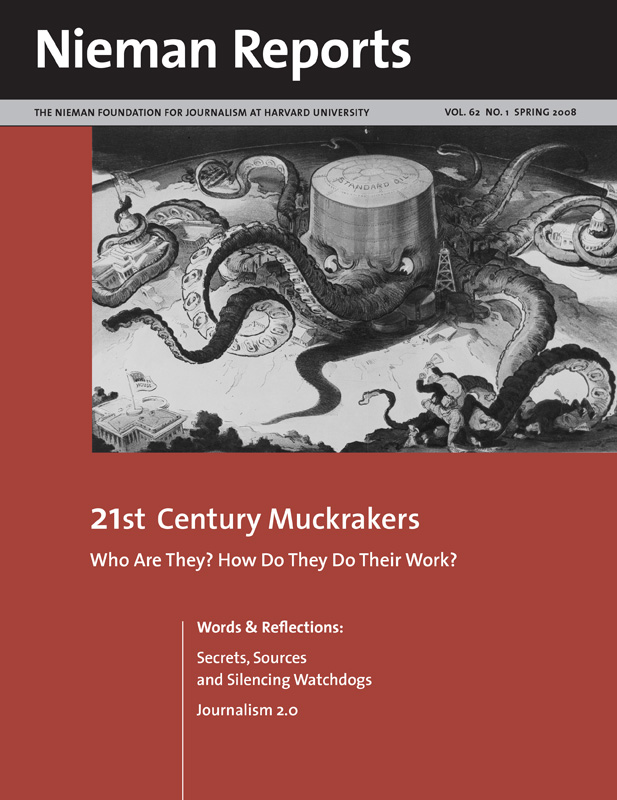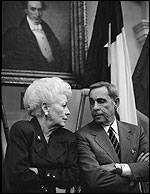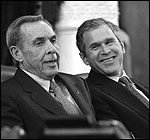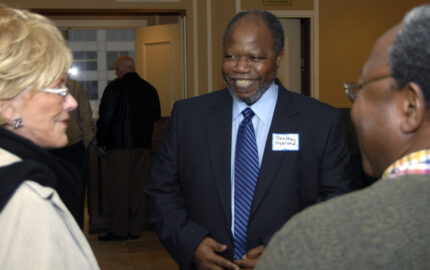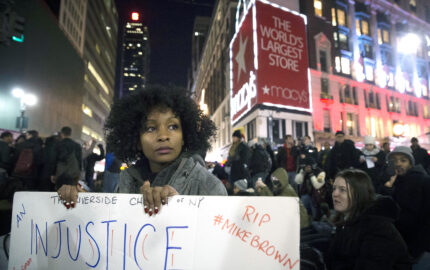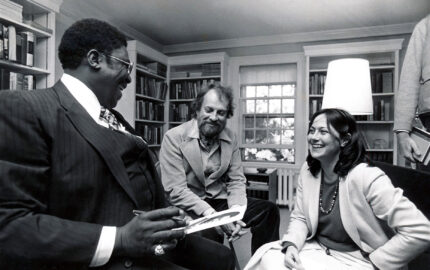Writing a biography of the late Bob Bullock, it seemed, would be a quick lap. Over three decades, we had amassed boxes of material on him and a catalogue of rich personal experiences. We had hundreds of living, willing witnesses, the detailed work of a generation of our fellow journalists, and a trove of his papers in an archive at Baylor University.
One unforeseen hitch: We underestimated Bob Bullock.
Because he never achieved rock star status, you reasonably might ask: Who was Bob Bullock? Why was he worthy of a biography? How do you underestimate a dead guy?
The answers to the first two questions are the same. Bullock was an ethically challenged, self-destructive, chain-smoking, pistol-packing, fistfighting, bipolar alcoholic with a volatile temper and a tongue that, George W. Bush once allowed, “should be registered as a lethal weapon.”
He also was, by most accounts, the most powerful and feared politician to hold office in Texas in the 20th century. In his 41 years of public service—state legislature, secretary of state, state comptroller, and lieutenant governor—Bullock wrote the book on how not to succeed in politics. But he never lost an election and, more amazingly, was never indicted. In fact, he parlayed 16 years as the state’s tax collector, who controlled thousands of jobs and set the lid on what the Texas Legislature could spend, into eight years as lieutenant governor—the operator of the engine room of state government.
“He was the largest Texan of our time,” then-Governor Bush said at Bullock’s funeral in 1999. “He was the most atrocious human being who ever lived,” former State Senator A.R. “Babe” Schwartz said of him in a private conversation with us a few years later.
“Complex” doesn’t begin to define Bullock. He was a liberal reformer in a conservative environment, yet he changed, usually for the better, nearly every facet of state government—from election and campaign laws to the recruiting of women and minorities into state jobs to modernizing the tax collection system, to name a few. He did it with a management style that Texas had not seen since its frontier days. He was a bully, a 5-foot, 9-inch, 145-pound verbal terrorist.
He once won an argument with the state’s attorney general by chest-bumping the startled A.R., slapping his cheek, and summing up his case thusly: “You skinny little sonofabitch, you’re squealing like a pig stuck under a gate.” Using his powers of persuasion to get a state senator from Houston to compromise on a racially sensitive bill, Bullock barked, “Show some leadership, you black motherfucker.”
Then there was Governor Bush, the conservative Republican who Democrat Bullock befriended, nurtured and tutored in the ways and means of governance. But their coziness had its limits. One afternoon, Governor Bush wandered onto the Senate floor uninvited—a protocol no-no, but often violated. Lt. Gov. Bullock, angry since Bush appointed the wife of his last election opponent to a state board, put down his gavel, stepped down from the podium, got close to the governor, gazed up into his eyes and said, “You’re a cocky little motherfucker, aren’t you?”
Bullock was powerful because he was feared, and feared because he was powerful. The constitution required the lieutenant governor to preside over the senate, but the senators, for sake of order and efficiency, made his authority almost dictatorial. He appointed committee members and chairmen and controlled the flow of legislation—who would be recognized to present bills, to which committees bills would go, which senators got to help him write the rough draft of the state budget.
Weapons of Persuasion
If that were not enough, Bullock had other weapons of intimidation. Guns. The tales of his earlier drinking days trailed him when he became a sober lieutenant governor.
At one of his favorite watering holes one bourbon-soaked evening, a waiter displeased him, and Bullock expressed his displeasure while holding a pistol to the man’s head. At another bar at another time, Bullock invited a reporter he disliked out to the patio. He sat down across from the reporter, laid a pistol on the table and said, “Sometimes I get so mad at you I want to shoot you. I wanted you to know that.”
Even sober, Bullock was likely to be packing. Suspecting that his son was hanging out in a drug house, Bullock went to extract him and was spotted by a neighbor approaching the house with a large sidearm. As he walked into a San Antonio museum to address a gathering of businessmen, a pistol fell out of Bullock’s pocket and skittered loudly across the marble floor. An aide calmly pocketed it, and the event proceeded.
His personal life also was anathema to political longevity. An inveterate womanizer, he was married five times, suffered chronic health problems from the abuse of alcohol and cigarettes, and built a rap sheet of DUI arrests. He drove recklessly—cars and motorcycles—and depression drove him one lonely night to playing Russian roulette.
Bullock and George W. Bush
Despite it all, Bullock prospered, achieving a level of influence in Texas that the governors who served with him could only envy. Depending on the point of view, he is often blamed for, or credited with, the political rise of George W. Bush by playing a backstage role in Bush’s defeat of Democrat Ann Richards in 1994 and by his endorsements of Bush for reelection as governor in 1998 and for president in 2000.
Bullock and Richards had been drinking buddies in the 1970’s until Richards checked in for alcoholism treatment in 1980—“drunk school,” Bullock called it. Bullock followed suit in 1981. In 1990, he was elected lieutenant governor, and she was elected governor.
The late columnist Molly Ivins, close friends with both, thought it bothered Bullock that Richards had gotten the governor’s job he lusted for. “She could get elected governor, and he couldn’t,” Ivins said.
After Bush upset Richards, Bullock coached him in the ways of bipartisanship and helped him enact his legislative agenda. Had Bullock chosen to do so, he could have made Bush’s term a shambles, thereby derailing his presidential ambitions. Instead, courted by Bush, he became the bipartisanship merit badge that Bush showed to the nation. Bullock didn’t live long enough to see his protégé reach the White House.
Controlling Even After Death
He died much as he had lived. In his last days, he instructed an aide to write his obituary. Reading the piece, Bullock slashed phrases, sentences, even whole paragraphs. “This is going to be a paid obit,” he snarled, “and I don’t want the goddamn Austin American-Statesman to make any money off me.” When a minister came to offer spiritual comfort, Bullock offered him a drink.
If ever a life cried out for biographical publication, it was Bullock’s. We signed contracts with the University of Texas Press and were preparing to hit the cruise control when things got curious. Nearly everywhere, we found generous cooperation from that vast network of Bullock colleagues, cronies, associates, drinking buddies, and childhood friends.
But—we began coming across men and women who had known him well and, no doubt, had revealing stories to tell, but politely declined to speak with us. One even notified the Baylor University library that her oral history interview was to be embargoed until further notice.
When we first approached the library to see the Bullock papers, we were given access to a few oral histories. There were stingy restrictions on the number of pages we could copy, but otherwise we were accommodated.
On our second visit, we were shut out. “We want to make sure that this material is not used in a negative way,” the curator explained. On subsequent visits, the answer was the same. Even Bullock’s extensive collection of newspaper and magazine articles was off limits. It was not a formidable obstacle, but one we might have anticipated had we been alert to the omens.
In the spring of 2001, almost two years after his death, state officials gathered to dedicate the Bob Bullock Texas State History Museum. Many of his old friends and enemies spoke softly about him, sometimes agreeing to press interviews only on the condition of anonymity. “He might be listening,” one of them whispered.
Several years later, a journalist visited the Texas State Cemetery, where Bullock was buried and whose restoration he had overseen during his last term as lieutenant governor.
Repeatedly, when the reporter asked why something was the way it was at the cemetery, caretaker Harry Bradley, who had been the first volunteer in Bullock’s first campaign for lieutenant governor, replied, “That’s the way Mr. Bullock wanted it.”
Finally, the reporter said, “But Bullock’s dead.”
Bradley arched an eyebrow and smiled. “Are you sure?”
Dave McNeely and Jim Henderson, authors of “Bob Bullock: God Bless Texas,” first met as Nieman Fellows in the class of 1976. Their friendship continued in Texas. McNeely has been a Texas political columnist for decades. Henderson, the author of three previous books, reported for the Tulsa World, Dallas Times Herald, and the Houston Chronicle. Information about their book can be found at the University of Texas Press.
One unforeseen hitch: We underestimated Bob Bullock.
Because he never achieved rock star status, you reasonably might ask: Who was Bob Bullock? Why was he worthy of a biography? How do you underestimate a dead guy?
The answers to the first two questions are the same. Bullock was an ethically challenged, self-destructive, chain-smoking, pistol-packing, fistfighting, bipolar alcoholic with a volatile temper and a tongue that, George W. Bush once allowed, “should be registered as a lethal weapon.”
He also was, by most accounts, the most powerful and feared politician to hold office in Texas in the 20th century. In his 41 years of public service—state legislature, secretary of state, state comptroller, and lieutenant governor—Bullock wrote the book on how not to succeed in politics. But he never lost an election and, more amazingly, was never indicted. In fact, he parlayed 16 years as the state’s tax collector, who controlled thousands of jobs and set the lid on what the Texas Legislature could spend, into eight years as lieutenant governor—the operator of the engine room of state government.
“He was the largest Texan of our time,” then-Governor Bush said at Bullock’s funeral in 1999. “He was the most atrocious human being who ever lived,” former State Senator A.R. “Babe” Schwartz said of him in a private conversation with us a few years later.
“Complex” doesn’t begin to define Bullock. He was a liberal reformer in a conservative environment, yet he changed, usually for the better, nearly every facet of state government—from election and campaign laws to the recruiting of women and minorities into state jobs to modernizing the tax collection system, to name a few. He did it with a management style that Texas had not seen since its frontier days. He was a bully, a 5-foot, 9-inch, 145-pound verbal terrorist.
He once won an argument with the state’s attorney general by chest-bumping the startled A.R., slapping his cheek, and summing up his case thusly: “You skinny little sonofabitch, you’re squealing like a pig stuck under a gate.” Using his powers of persuasion to get a state senator from Houston to compromise on a racially sensitive bill, Bullock barked, “Show some leadership, you black motherfucker.”
Then there was Governor Bush, the conservative Republican who Democrat Bullock befriended, nurtured and tutored in the ways and means of governance. But their coziness had its limits. One afternoon, Governor Bush wandered onto the Senate floor uninvited—a protocol no-no, but often violated. Lt. Gov. Bullock, angry since Bush appointed the wife of his last election opponent to a state board, put down his gavel, stepped down from the podium, got close to the governor, gazed up into his eyes and said, “You’re a cocky little motherfucker, aren’t you?”
Bullock was powerful because he was feared, and feared because he was powerful. The constitution required the lieutenant governor to preside over the senate, but the senators, for sake of order and efficiency, made his authority almost dictatorial. He appointed committee members and chairmen and controlled the flow of legislation—who would be recognized to present bills, to which committees bills would go, which senators got to help him write the rough draft of the state budget.
Weapons of Persuasion
If that were not enough, Bullock had other weapons of intimidation. Guns. The tales of his earlier drinking days trailed him when he became a sober lieutenant governor.
At one of his favorite watering holes one bourbon-soaked evening, a waiter displeased him, and Bullock expressed his displeasure while holding a pistol to the man’s head. At another bar at another time, Bullock invited a reporter he disliked out to the patio. He sat down across from the reporter, laid a pistol on the table and said, “Sometimes I get so mad at you I want to shoot you. I wanted you to know that.”
Even sober, Bullock was likely to be packing. Suspecting that his son was hanging out in a drug house, Bullock went to extract him and was spotted by a neighbor approaching the house with a large sidearm. As he walked into a San Antonio museum to address a gathering of businessmen, a pistol fell out of Bullock’s pocket and skittered loudly across the marble floor. An aide calmly pocketed it, and the event proceeded.
His personal life also was anathema to political longevity. An inveterate womanizer, he was married five times, suffered chronic health problems from the abuse of alcohol and cigarettes, and built a rap sheet of DUI arrests. He drove recklessly—cars and motorcycles—and depression drove him one lonely night to playing Russian roulette.
Bullock and George W. Bush
Despite it all, Bullock prospered, achieving a level of influence in Texas that the governors who served with him could only envy. Depending on the point of view, he is often blamed for, or credited with, the political rise of George W. Bush by playing a backstage role in Bush’s defeat of Democrat Ann Richards in 1994 and by his endorsements of Bush for reelection as governor in 1998 and for president in 2000.
Bullock and Richards had been drinking buddies in the 1970’s until Richards checked in for alcoholism treatment in 1980—“drunk school,” Bullock called it. Bullock followed suit in 1981. In 1990, he was elected lieutenant governor, and she was elected governor.
The late columnist Molly Ivins, close friends with both, thought it bothered Bullock that Richards had gotten the governor’s job he lusted for. “She could get elected governor, and he couldn’t,” Ivins said.
After Bush upset Richards, Bullock coached him in the ways of bipartisanship and helped him enact his legislative agenda. Had Bullock chosen to do so, he could have made Bush’s term a shambles, thereby derailing his presidential ambitions. Instead, courted by Bush, he became the bipartisanship merit badge that Bush showed to the nation. Bullock didn’t live long enough to see his protégé reach the White House.
Controlling Even After Death
He died much as he had lived. In his last days, he instructed an aide to write his obituary. Reading the piece, Bullock slashed phrases, sentences, even whole paragraphs. “This is going to be a paid obit,” he snarled, “and I don’t want the goddamn Austin American-Statesman to make any money off me.” When a minister came to offer spiritual comfort, Bullock offered him a drink.
If ever a life cried out for biographical publication, it was Bullock’s. We signed contracts with the University of Texas Press and were preparing to hit the cruise control when things got curious. Nearly everywhere, we found generous cooperation from that vast network of Bullock colleagues, cronies, associates, drinking buddies, and childhood friends.
But—we began coming across men and women who had known him well and, no doubt, had revealing stories to tell, but politely declined to speak with us. One even notified the Baylor University library that her oral history interview was to be embargoed until further notice.
When we first approached the library to see the Bullock papers, we were given access to a few oral histories. There were stingy restrictions on the number of pages we could copy, but otherwise we were accommodated.
On our second visit, we were shut out. “We want to make sure that this material is not used in a negative way,” the curator explained. On subsequent visits, the answer was the same. Even Bullock’s extensive collection of newspaper and magazine articles was off limits. It was not a formidable obstacle, but one we might have anticipated had we been alert to the omens.
In the spring of 2001, almost two years after his death, state officials gathered to dedicate the Bob Bullock Texas State History Museum. Many of his old friends and enemies spoke softly about him, sometimes agreeing to press interviews only on the condition of anonymity. “He might be listening,” one of them whispered.
Several years later, a journalist visited the Texas State Cemetery, where Bullock was buried and whose restoration he had overseen during his last term as lieutenant governor.
Repeatedly, when the reporter asked why something was the way it was at the cemetery, caretaker Harry Bradley, who had been the first volunteer in Bullock’s first campaign for lieutenant governor, replied, “That’s the way Mr. Bullock wanted it.”
Finally, the reporter said, “But Bullock’s dead.”
Bradley arched an eyebrow and smiled. “Are you sure?”
Dave McNeely and Jim Henderson, authors of “Bob Bullock: God Bless Texas,” first met as Nieman Fellows in the class of 1976. Their friendship continued in Texas. McNeely has been a Texas political columnist for decades. Henderson, the author of three previous books, reported for the Tulsa World, Dallas Times Herald, and the Houston Chronicle. Information about their book can be found at the University of Texas Press.
